-
•
•
16 responses
I want to note, upfront, that although this post was inspired by Rachel’s and Alison’s excellent recent posts, it is not meant in any way to respond to them. I fully agree with them that there are returned missionaries—even active, temple-attending returned missionaries—who do bad things. And those bad things can, physically, spiritually, and emotionally, hurt people around them, especially where the people around them (reasonably) believe that returned missionaries should not do bad things. Moreover, being male, my relationship with (male) returned missionaries did not have the same structural inequities Alison and Rachel describe, even when I was younger.… Read More
-
•
•
3 responses
Spiritual history is replete with types and shadows. The similarities that appear between events in widely-separated places and times lead to the conclusion that the Lord is trying to point out some truth to us, something we need to understand. I see a kind of repetition in this week’s Gospel Doctrine lesson, in which Samuel the Lamanite tries to call the Nephites to repentance (Helaman 13-16). Samuel preached just a few years before the birth of Christ, and he prophesied about the destruction in the Americas that would accompany Christ’s crucifixion soon afterward. But somehow his prophecies don’t sound very… Read More
-
•
•
8 responses
Coreen Johnson has graciously provided this personal story of Mormon Life, which I loved and thought would be a great addition here. Coreen is a stay-at-home mother of 4 who now lives in New Mexico. Enjoy! Elliot’s Vagrants by Coreen Johnson, FMHer “Hey lady! Do you have a dollar? Just a dollar! Please lady! Just a dollar! Please, ma’am!” Read More
-
•
•
6 responses
As a result of its political neutrality policy, the Church is not going to endorse Mitt Romney in his bid to become President (or, for that matter, Harry Reid in his bid to be reelected to the Senate). There are probably a number of reasons for the Church’s desire to avoid endorsing a candidate but, as I’ve said previously, one reason may well be the tax consequences of such an endorsement. (Short refresher: technically, the IRS could revoke the Church’s tax exemption, meaning the Church would owe taxes on all of its income other than donations, and that Church members… Read More
-
•
•
6 responses
Chapters 6 to 12 of Helaman highlight what Mormons have come to call the “pride cycle” — the cycle from righteousness and prosperity to pride and wickedness to suffering and to humility and repentance, leading back to righteousness and prosperity. Its a fascinating concept, one that I’m afraid we use too often to describe the world and others, and too little to refer to ourselves. I mean, when was the last time you asked yourself where you were in the “pride cycle?” Read More
-
•
•
11 responses
Once upon a time, the rare article or essay on Mormonism was noteworthy and bloggable. Now, in this extended Mormon Moment, there are so many it is hard to even keep track of them. But Adam Gopnik’s article “I, Nephi: Mormonism and its meanings” deserves special notice, not just because The New Yorker is widely read and respected but because it is a serious and informed discussion. Maybe the media is getting better when it comes to discussing Mormonism. Read More
-
•
•
9 responses

[The third part of a translation of an article written by Emanuel Santana and published on the Brazilian group blog, Vozes Mórmons. The article raises many questions about politics and the Church—questions we are familiary with in the U.S. and perhaps Canada, but which are new territory for Mormons in Brazil and elsewhere around the world. Part one of this series was published Tuesday.] . Moroni Torgan and the Church in Fortaleza by Emmanuel Santana The 2004 race for mayor was more exciting. The “Juraci Era” had put Fortaleza’s voters in the mood for change. Inácio Arruda and Moroni Torgan… Read More
-
•
•

[The second part of a translation of an article written by Emanuel Santana and published on the Brazilian group blog, Vozes Mórmons. The article raises many questions about politics and the Church—questions we are familiary with in the U.S. and perhaps Canada, but which are new territory for Mormons in Brazil and elsewhere around the world. Part one of this series was published yesterday.] . Moroni Torgan and the Church in Fortaleza by Emmanuel Santana Out of the books and stories of their elders. I can not remember anything of Moroni’s first election, since occurred just a few years after… Read More
-
•
•
3 responses

Finally, a book by Steve Peck that I can read with my children! At first my husband thought that would be A Short Stay in Hell; it is only 70 pages, but I had to disabuse him of that notion. As much as children enjoy thinking about infinity (How can anything go on forever? But if there is a limit, what is on the other side?), I thought the main character was brutally murdered far too many times to be appropriate bedtime reading material for small children. And I would like to save that little volume for them to read… Read More
-
•
•
6 responses

The following is a translation from an article written by Emanuel Santana and published on the Brazilian group blog, Vozes Mórmons. I have divided it into three parts because the post is so long and raises so many questions about politics and the Church—things that strike me as repeatedly-covered issues in the U.S. and perhaps Canada, but which are new territory in Brazil and elsewhere around the world. This first part covers background information, from the introduction of the Church in Fortaleza to Moroni Torgan’s arrival and rise to prominence as Brazil’s first Mormon Congressman. Read More
-
•
•
3 responses
The corruption and internal strife in the initial chapters of Helaman are marked by the rise of secret combinations among the Nephites and Gadianton’s rule over the band eventually known as Gadianton’s Robbers. While I think our society today is far from the level of corruption seen then, we certainly deal with similar corruption to a smaller degree. And societies we do know today (perhaps Somalia and Zimbabwe and probably others also) seem as corrupt or worse than what the Nephite’s had to deal with. It is hard to imagine how anyone survives such regimes without also becoming corrupt. Read More
-
•
•
8 responses
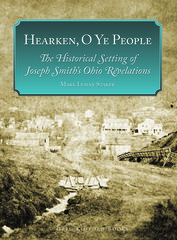
I received my review copy of Hearken, O Ye People at work; I opened it and began to read on the El heading home. And, from page 1 (or, actually, page xvii), my jaw dropped. Staker started his book with an almost-15-page chronology of Kirtland, beginning in May 1796 as a group begins to survey townships in the Western Reserve and ending on July 6, 1838, when Kirtland Camp leaves Kirtland to settle in Missouri. For that chronology alone, Hearken, O Ye People is worth its price, at least for those form whom the Kirtland years are overshadowed by the… Read More
-
•
•
21 responses
Today is the 15th anniversary of the end of my mission. (Note that I can’t entirely remember what I mean by that—I’m pretty sure that August 5, 1997, was my last day of proselytizing, the 6th I got on an airplane, and the 7th I arrived home. But it has been 15 years, and I’m not 100% sure.) And what does that two years mean to me, 15 years later? On one level, not a whole lot. I don’t think about it a whole lot; my days are much more likely spent occupied by the Internal Revenue Code. Or my… Read More
-
•
•
3 responses
The story of Helaman’s 2060 stripling warriors (the subject of Sunday School lesson #33) is another of the most cited and, I assume, the more beloved among young men and boys. However, the main idea broached in the lesson, that these young men were righteous and obeyed “every word of command with exactness,” could easily be lost in the midst of their military valor. The stripling warriors, like many of those who serve in military service around the world today, are indeed heroes—but, Eliza R. Snow observes that there are other, more valuable ways to be a hero: Read More
-
•
•
5 responses
Christopher Jones has a post over at the fine group blog Peculiar People listing ten books on modern Mormonism. The post deserves more discussion, so I thought I’d post my own short comments on the first four books from the list and invite readers to add comments on the others as well as reflection on the original post by Jones. Read More
-
•
•
One response
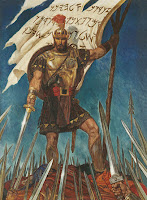
The 10 chapters in this week’s Sunday School lesson (#31) are among the most exciting in the Book of Mormon—at least if you are a 10-year-old boy. They tell the story of Captain Moroni, the battles he fought for freedom, and his “Title of Liberty.” Of course, even for adults they are important chapters, detailing a struggle for liberty and raising the kind of questions that so many in the world have to face, even today, when addressing what kind of government their country needs. Even in most western democracies, the issues of liberty have at least a peripheral connection… Read More
-
•
•
17 responses
![Book of Mormon Word Cloud [updated]](https://timesandseasons.org/wp-content/uploads/2012/07/WordItOut-Word-cloud-96918.png)
I’ve been curious what a word cloud of the Book of Mormon would look like, so , just for fun on a Friday, I finally made one. I don’t have a lot to say about it, other than that “unto” seems to be a very popular word (which doesn’t really surprise me, but I didn’t expect, either). “Lamanite” shows up more than “Nephite,” though the usage of both is dwarfed by “people.” I took the text from the 1830 edition of the Book of Mormon, and I copied it from here, and I made the cloud using WordItOut. (Note that… Read More
-
•
•
63 responses
[Times & Seasons welcomes the second in a pair of posts from Ralph Hancock this week, who previously guested with us in 2010] I argued in Part I that the move from “apologetics” to “Mormon Studies” requires a bracketing of truth claims that may serve legitimate scholarly purposes, but that carries with it certain significant risks. The New Mormon Studies presents orthodoxy as stifling and itself as intellectually liberating, but it risks purveying a more subtle and powerful conformism, the conformism of secular academic prestige and careerism. This is intended, not as a condemnation, but as an alert. We ought to embrace opportunities… Read More
-
•
•
3 responses
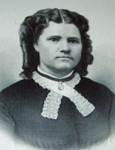
As Alma talks with his son Corianton in Alma 40-42, he realizes that Corianton does not understand some basic elements of the Plan of Salvation. From what Alma teaches him, we can surmise that Corianton doesn’t understand that all will be resurrected, that each person will be resurrected according to their words in this life (the righteous to happiness and the wicked to misery), and the roles that justice and mercy play in the great plan of happiness. From the context, it is clear that all these teachings were in response to Corianton’s misdeeds while serving a mission, a similar… Read More
-
•
•
75 responses
[Times & Seasons welcomes the first in a pair of posts from Ralph Hancock this week, who previously guested with us in 2010] The recent unpleasantness at BYU’s Maxwell Institute has, the reader will have noticed, triggered much comment on the internet, including celebrations in some quarters over the supposed demise or at least eclipse of certain defenders of the faith at the Institute —characterized by some as apologists — who have been willing over the years to call out arguments they see as weakly reasoned and hold critics of the Church to account for their claims. Although I do not know… Read More
-
•
•
41 responses
As most readers here no doubt know, Mormon academic and author Stephen R. Covey died earlier this week. Covey was best known for his highly popular self-help book, The Seven Habits of Highly Effective People, which earned him fame and fortune, as well as some detractors. His death, together with the fact that my bookclub is currently reading Viktor Frankl’s influential book Man’s Search for Meaning and that I came across an old conference talk drawn from a self-help book, led me to ponder a bit about Covey’s influence and self-help books in general and the influence that these… Read More
-
•
•
72 responses
Rachel’s post a couple of weeks ago, The Threat of New Order Mormons, attracted so much discussion that I would like to follow up with my own discussion of middle-path Mormons. Various terms are used to describe those who self-categorize themselves as something other than fully active, fully believing Mormons: Uncorrelated Mormons, Cultural Mormons, New Order Mormons, Liahona Mormons, and so forth. My view is that there are many paths that lead away from full activity and belief, so it is wrong to expect one label to adequately describe what is actually happening. It’s clear these members move away from… Read More
-
•
•
2 responses
Alma 36 to 39 contain Alma’s advice to his three sons, Helaman, Shiblon and Corianton, which led me to the idea of parental advice—something that usually accumulates bit by bit over years rather than all in one block as Alma seems to have done with his sons. Of this advice, perhaps the most famous, especially when it comes to Mormon literature, is the advice given to Corianton and the reason for that advice. Corianton’s story has been the source for dozens of literary works — so much so that encountering a character in a Mormon story named “Cory” should automatically… Read More
-
•
•
10 responses
So after several recommendations, I finally got around to reading Benedict Anderson’s Imagined Communities. The book examines a simple question: how do institutions or nations (the book’s focus is on nationalism) create a sense of identity in their membership or citizenry? It’s one thing to feel a sense of identity with a group whose membership one knows personally: an extended family, a village, a small company. But what about churches or corporations or countries whose members, workers, or citizens number in the millions? The more you ponder that question, the more interesting it becomes. In that light, let’s talk about… Read More
-
•
•
44 responses
For some time I’ve been trying to build a list of Mormons playing soccer throughout the world, and over time I think I’ve come up with a start of one. So far I’ve found about a dozen Mormons who have ever played professional soccer somewhere in the world. Amazingly enough, three of these have played at the World Cup level. But only 2 of these are playing now, and one of these two is playing in the U.S. In addition one Mormon is coaching at the professional level and another at the NCAA Division I level (outside of the BYU… Read More
-
•
•
One response
Today Alma’s discourse on the development of faith in Alma 32 is well known among Mormons and widely referred to on almost any discussion of faith. The “nourishing” of seeds and plants is, of course, common in poetry — its the comparison of seeds and growth with faith or the word that is important to Mormonism. I haven’t researched whether or not this discourse was used frequently like it is today. But there are elements of the idea and description in the chapter which can be found in some early Mormon poetry. Parley P. Pratt used it in the following… Read More
-
•
•
14 responses

One of the things almost sure to be heard in testimony meeting after someone has traveled (whether it’s across the ocean or just to the next town over) is an expression of gratitude that “the Church is the same no matter where you go.” To a certain extent, it’s true. We all sing the same hymns, although every ward congregation seems to have its particular favorites. We all read the same scriptures. Sunday meetings follow the same general format, even if the meetings are in a different order. Thanks to Correlation, Sunday School and other lesson manuals are standardized and… Read More
-
•
•
10 responses
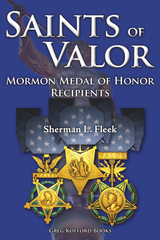
A couple of months ago I received a review copy of Saints of Valor: Mormon Medal of Honor Recipients (Greg Kofford Books, 2011; 430 pages in paperback | publisher’s page). I’m going to first discuss two issues related to war and Mormonism: (1) how Mormons serving in the military improve the public perception of Mormonism; and (2) the ambiguous position of Mormonism on participation in war versus pacificism. Then I will provide a short discussion of the book itself. War and Mormonism The willingness of LDS volunteers of the Mormon Battalion to serve in the US Army was largely forgotten… Read More
-
•
•
6 responses
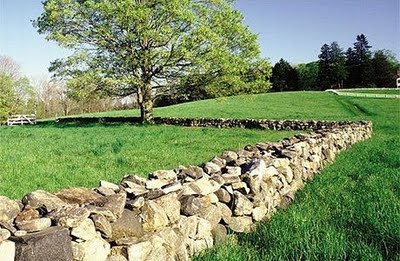
As my children have grown and started to leave home, I find myself conflicted by the idea of Independence. Of course I want them to be independent, to go off on their own, make their own choices and even, to be frank, to require less or none of my support and effort. Its not that I’m not willing to give them support and effort, but more that just as they need to be independent, my wife and I would like fewer requirements. We, too, would like a bit more independence. Read More
